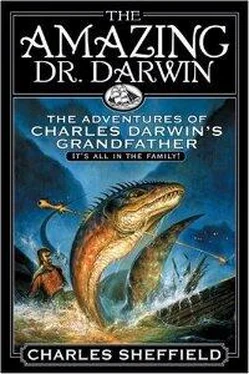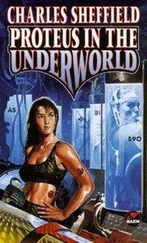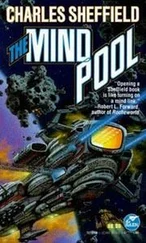“Pass the light down to me.” His voice came back hollow and distant, added to a nearby sound of trickling water. “Then come yourselves.”
Joseph Faulkner went first, with a caution appropriate to his age. The others followed, with Jacob Pole firmly in tailguard position.
“Guarding the rear,” he muttered.
“Aye, Jacob.” Darwin’s voice boomed from the darkness ahead. “Your own, no doubt.”
They were emerging to stand on a long wet ledge about five yards wide. Beyond it, black and restless, flowed a stream of twice the width.
“It’s a river,” Mary said. “A real underground river.”
“It is.” Darwin was staring around him with vast satisfaction. “And it should be no surprise to us. London is ancient. We tend to forget the obvious, but this city, too, was once no more than woods and meadows. Most of the old streams run now below the surface, invisible and out of mind. And this must be one of them.”
“You know, ’Rasmus, you’re quite right.” Jacob Pole was leaning over and staring at the water, his mouth open. “And me a Londoner, native born. I ought to be ashamed of myself. I knew this from my childhood. There were four old rivers on the north shore, the Walbrook, the Fleet, the Tyburn, and the Westbourne. Unless my old schooling serves me false, this must be a spur of the old Walbrook. The main river rises in Finsbury, and runs close by the Mansion House. It joins the Thames by Dowgate—or used to; but I’ve heard no mention of it for years and years.”
“But what are you seeking here?” Mary stepped close to the lip of the stream, peering over the worn stone edge at the water. “Is it that?”
She was pointing down. In the moving water, firmly supported by metal braces from the stony edge, sat a new structure. It was a waterwheel, and it was turning steadily under the pressure of the flow.
“That will do excellently well for a beginning.” Darwin hunched low, and examined the wheel’s construction. “Skillfully made,” he said after a moment. “And recently set in place. There is a natural steady flow from the river, but I think temporal variation comes mostly from tidal change. Now then. Here, things become more interesting.” He was moving with the lantern, following a pair of long black lines that ran from the wheel’s center, into a complex tangle of broken gears and wheels, then finally appeared again to run across and up the slippery wall. He bent low, and scraped at the surface of one of the lines with his thumb nail. There was a glint of metal beneath.
“Where do they lead?” Faulkner asked. Mary Rawlings was holding his arm, in real or simulated nervousness, and the older man was enjoying the whole experience. “What’s above there? It must be part of the hall itself.”
“It is.” Darwin followed the lines up with the lantern’s beam, until they disappeared into the ceiling. “We are exactly beneath the pedestal. If it were present, the Heart of Ahura Mazda would stand right above us.”
“But where’s the Guardian?” Mary asked. “Weren’t you expecting to see Sharani here?”
“I was hoping to do so. I was not expecting it.” Darwin ventured along the stony side of the underground stream, leading the way quietly through dark and filthy culverts. Water dripped steadily onto their heads from dark wooden beams and brick arches, the latter furred over with mildew and patches of grey fungus. All the while, the rain-fed stream murmured along no more than a yard from their feet.
“Aha.” Darwin paused, half a dozen paces ahead of the rest. “Something new. Bring the other light, Joseph, and let’s take a close look.”
He had reached a forlorn heap of garments, bright scarlets and purples dulled by lantern light. Beyond them, the stream branched into three smaller tributaries.
Darwin lifted a glittering robe and turban. “The servant of Ahura Mazda. Vanished into thin air, as Colonel Pole suggested, at this very point.” As he spoke, a cold air blew through the tunnel, rippling the cloth in his hand.
Pole gave a little grunt and retreated a step. “Disembodied. Then we can follow him no farther with human agents?” His voice hovered between hope and disappointment.
“We cannot,” said Darwin cheerfully. “However, that does not mean he cannot be followed by inhuman ones. Friend Daryush Sharani has made a most serious mistake. He should have thrown his outer garments into the river, rather than leaving them here. Don’t touch the rest of these clothes.” He turned to Faulkner. “Joseph, we require assistance. Can you find me a pair of bloodhounds?”
“At this hour? Erasmus, you certainly ask a lot of me.” But Faulkner sounded delighted, and after a moment he turned to Crosse. “Richard, you know Tom Triddler’s place, up past the Mansion House. Would you go there, and ask him for a pair of his best tracking hounds? Tell him it is for me. You’ll have to bang on his door, because he’s half deaf. But keep hammering. He’ll come.”
Crosse hesitated, turning his head to one side and opening and closing his mouth. Finally he nodded and hurried away into the darkness without speaking.
“I just don’t know what’s got into Richard tonight,” Faulkner said. “He’s behaving very odd. So witless and confused, you’d think he was in love.”
“He is certainly that,” said Darwin. “With Miss Florence Trustrum. Is it not obvious to you? He regards her with the hopeless yearning of a mortal for a goddess. Knowing your own fascination for such things, I am only astonished that you did not observe it long since.”
He walked slowly back along the tunnel to the place where they had entered, and squatted down on the wet stone. And there, as unconcerned as though he sat in Faulkner’s warm parlor, he began to examine in detail the mass of gears, wheels, wires, and pulleys that sat directly beneath the pedestal in the Exhibition Hall.
“Broken,” he said after a few minutes. He held up a handful of components. “Quite deliberately, and beyond repair. I conjecture that several elements have also been removed. Without hints from its maker, its purpose is hard to divine.”
“Never mind that old junk.” Jacob Pole had been wandering moodily around, staring down now and again at the dark water. “I was hoping for excitement and treasure, not standing around in a smelly damp sewer. Are you really expecting a dog to be able to track down here, in the cold and dark? Tracking dogs need light and air.”
“Not at all, Jacob. That is an old wives’ tale.” Darwin raised himself laboriously to his feet. “A good tracking dog will follow a scent as well at night as during the day, as well for a nonliving scent as for a living spoor, and as well underground as on the surface. If we are looking for a mystery tonight, we will find none greater than a hound’s nose. It possesses subtleties for distinction of odors that we can scarcely imagine. How many centuries will it be, think you, before mankind will produce a machine to rival the nose of a dog for sensitivity and discernment?”
“Well.” Pole sniffed. “I’m not persuaded. We’ll see, soon enough. But I’d always been told that if you took a tracking hound into a dark, airless place—”
He was interrupted by a cry from above, and a sound of clattering footsteps overhead.
“Here they come,” Darwin said. “And now perhaps we can observe one of the wonders of Nature.”
Richard Crosse came down the ladder first, carrying a mournful-looking black hound with jowls and ears that hung below its lower jaw. After him came a rumpled man carrying a second dog.
“Late work, Tom Triddler,” said Faulkner cheerfully. He rubbed his hands. “No matter, I’ll see you’re well rewarded for it. Good trackers, are they?”
Читать дальше












